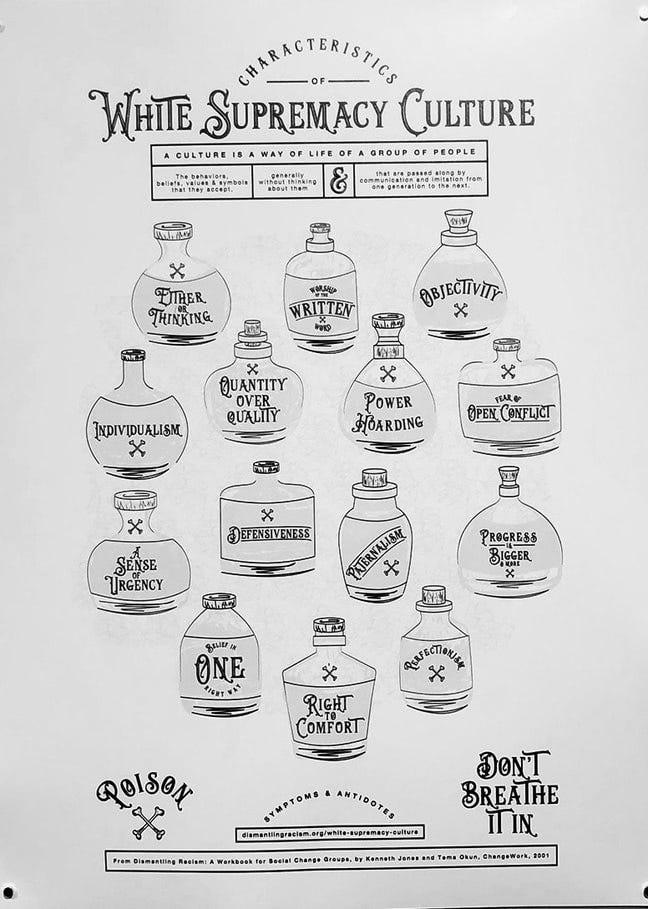
Let's be honest -- most of us are terrified of conflict and avoid it at all costs. Even though now I am a conflict coach and mediator, I wasn’t always excited about conflict. In fact, I used to try to avoid conflict so that I wouldn't lose relationships or have to be in conversations that felt vulnerable and hard. I thought I could just avoid it, either through people pleasing or through checking out of relationships altogether. And this is most peoples’ experiences.
Even though conflict is a natural and normal part of all relationships, being scared of conflict, in this society, is actually very common.
So why do people find conflict so scary? If we look at the foundations of Western colonial society we can find the answers.
First, our society is founded on white supremacy and the characteristics of white supremacy show up in our relationship to conflict. Defensiveness, black/white thinking (or binary thinking), "one right way" thinking and the right to comfort all play into conflict feeling scary. If you look at the graphic below, you can see all the characteristics of white supremacy culture and connect how they prevent healthy conflict navigation. (If you want me to delve more into this let me know in the comments below!)

Navigating conflict well needs us to drop the defensiveness, to be open to the grey areas of life, to other perspectives and to feeling uncomfortable. When we have been stewing in the broth of white supremacy our whole lives, it's no wonder that conflict feels scary. It challenges the foundations that we have been raised in (regardless of race, we are all steeped in white supremacy).
Additionally, we live in a capitalist society that says there must be winners and losers. The winners are the ones who make the money, through outcompeting others. The losers are everyone else. And you don't want to be a loser. We take that perspective into conflict, often setting up a win-lose situation so that, instead of mutual understanding and collaborative solution generation, conflict becomes about establishing the winners and losers. And of course we're scared of being the losers. Because the losers don't get any of their needs met. So why would we go into conflict when there's the possibility that the outcome means we don't get any of our needs met?
Not only that, but we live in a punitive justice system - one that says that if you do something wrong you should be punished. Instead of working towards eliminating the causes of “crime” or working to rehabilitate people, we put them in jail/prison, or exact some other form of punishment on them. Our society show us, again and again, that when you mess up, you deserve punishment and the only option for dealing with mistakes is punishment. So of course we'd be scared of conflict. Who wants to risk punishment? (In social circles punishment can look like ostracization, removal of social connections, public humiliation, public demonization etc etc).
White supremacy, capitalist culture and punitive justice are the foundations of our society and they impact every relationship. And because it is the water we swim in, we often can't see it, even though we know it doesn't feel right. And most people are exposed to white supremacist, punishment-based, win/lose forms of conflict since childhood so we don’t know that any other ways can exist.
As children, we don't learn the skills to navigate conflict well in our families or schools. We aren’t given the skills and/or emotional intelligence to navigate conflict. We aren’t shown any other options other than damaging and scary options present by capitalist, white supremacist, punitive justice models. And so we feel incredibly unprepared and unskilled to show up in conflict well. Not knowing how to do something is also scary.
All this is to say -- it makes sense why you, and most people, are scared of conflict.
However, without confronting our fear of conflict, we risk losing so much. We risk having really shallow and/or fleeting relationships, because no deep and intimate relationship lasts without working through conflict. We risk missing out on stimulating and supportive community because community means relating to people with differing opinions and ways of walking in the world, which generates conflict. We risk opportunities for deep solidarity and powerful movement work because finding ways to work together between class, race, gender, sexuality, ability etc etc breeds conflict.
We can also build skills for navigating conflict, and practice together, making it feel less scary.
The benefits of learning and practicing navigating conflict far outweigh the fear. By confronting our fear we can build stronger, more connected and supportive communities, families and movements.
And isn't that worth it?
(If you want to learn more conflict skills or you need support navigating a conflict please go to my website and reach out to me on how I can support you in your conflict journey).
If you enjoyed this post, please consider subscribing and/or becoming a paid subscriber for $5/month.
If you think someone you know needs to read this post, please share it with them.
In solidarity,
Amelia



